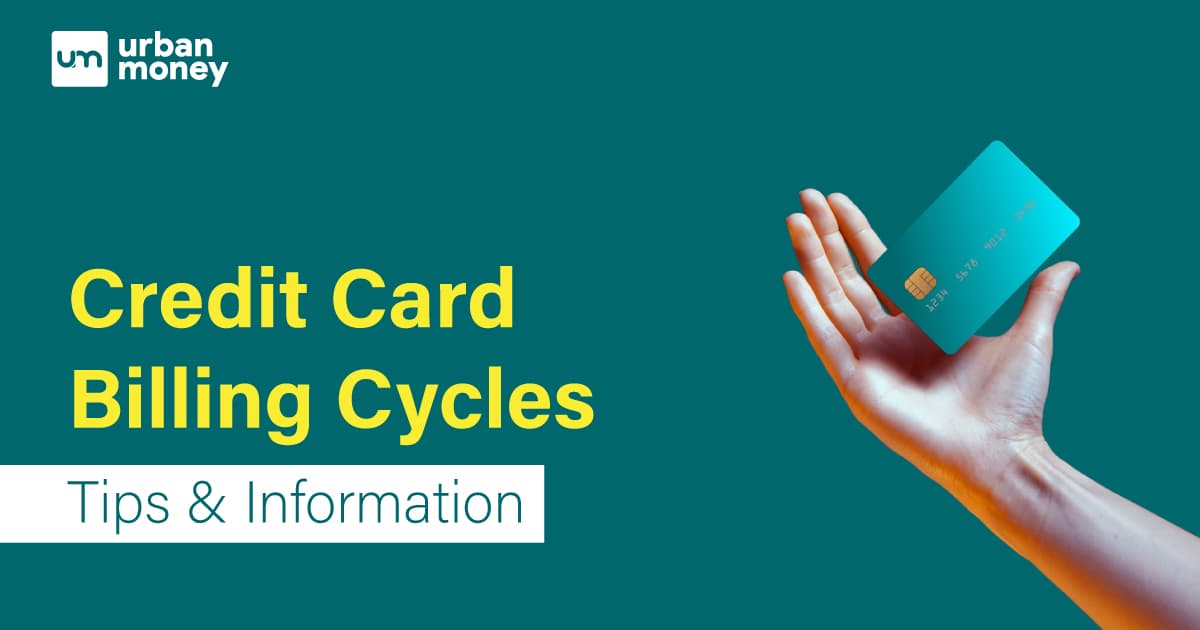- Home
- Credit Card
- Credit Card Billing Cycle
Credit Card Billing Cycles: How its Works and Impact CIBIL Score?

A credit card billing cycle refers to the period between the start and end of a credit card statement. Within this cycle, you have the freedom to make purchases using your credit card. All the transactions made during this time, including purchases, cash advances, and fees, are recorded and accumulated.
At the end of the billing cycle, your credit card issuer generates a statement that provides a detailed summary of all your transactions and charges. It is important to review this statement to ensure its accuracy. You are then given a specific timeframe, typically around 21 to 25 days, to pay off your outstanding balance in full without incurring any interest charges. If you do not pay the full amount by the due date, interest will be applied to the remaining balance.
- Personalized solutions
- Expert guidance
- Application assistance
- Credit score discussion
- Interest rate comparison
Table of Content


Last Updated: 14 December 2025
How it works
Interest on credit cards in India is charged on a daily reducing balance basis. This means that interest is calculated on the outstanding balance at the end of each day. The interest rate is applied to the outstanding balance and then multiplied by the number of days in the billing cycle. The total interest charge is then added to the outstanding balance at the end of the billing cycle.
For example, if your credit card has an interest rate of 20% per year and your outstanding balance at the end of the billing cycle is Rs. 10,000, then you will be charged Rs. 500 in interest.
The interest rate on credit cards in India can vary from issuer to issuer, but it typically ranges from 18% to 30% per year. The interest rate is also affected by your credit score. If you have a good credit score, you may be able to get a lower interest rate on your credit card.
Billing Cycle Start And End Dates
The billing cycle start and end dates in India can vary depending on the credit card issuer and the type of card. However, most credit cards in India have a billing cycle that lasts for 25-31 days. The billing cycle begins on the first day of the month and ends on the last day of the month.
At the end of the billing cycle, your credit card issuer will send you a statement that lists all of the transactions that you made during the period. The statement will also show you the interest charged if you do not pay your balance in full by the due date.
Here are some examples of billing cycle start and end dates for some popular credit cards in India:
- Citibank PremierMiles Credit Card: Billing cycle starts on the 1st of the month and ends on the 30th of the month.
- HDFC Bank Regalia Credit Card: Billing cycle starts on the 15th of the month and ends on the 14th of the following month.
- ICICI Bank Amazon Pay Credit Card: Billing cycle starts on the 1st of the month and ends on the 28th of the month.
Due Date And Minimum Payment
The due date is by which you must pay your credit card bill in full in order to avoid paying interest charges. The minimum payment is the smallest amount you pay on your credit card bill to avoid late fees.
The due date and minimum payment for a credit card are usually specified on your credit card statement. You can also find this information by contacting your credit card issuer.
If you are unable to pay your credit card bill in full by the due date, you should still make a minimum payment. The minimum payment helps reduce your outstanding balance and prevent your credit score from taking a hit.
Tips To Manage Credit Card Bills
It is important to understand how credit card billing cycles work so that you can make the most of your credit card and avoid paying unnecessary interest charges. Here are a few tips for managing your credit card billing cycle:
- Track your spending: It is important to track your spending during the billing cycle so that you know how much you need to pay by the due date. You can use a credit card tracking app or simply keep a running tally of your expenses.
- Make payments on time: Make sure to pay your credit card bill in full by the due date. This will help you avoid paying interest charges and build your credit history.
- Take advantage of grace periods: Most credit cards offer a grace period, which is a period of time after the due date, during which you will not be charged interest on your purchases. If you can pay your bill in full within the grace period, you can avoid paying any interest charges.
Billing Cycle Duration in India
The credit card billing cycle duration in India can vary from issuer to issuer, but it typically ranges from 27 to 31 days. The billing cycle is the period of time between when your credit card statement is generated and when your payment is due.
For example, if your billing cycle starts on the 1st of the month and your payment is due on the 20th of the month, then your billing cycle would be 20 days long. During this time, you can make purchases on your credit card and those purchases will be reflected on your statement.
Once your statement is generated, you will have a grace period of typically 20-25 days to pay your bill before interest charges start to accrue. So, in the example above, if you don’t pay your bill by the 10th of the month, you will start to accrue interest on your outstanding balance.
Interest-Free Period of a Credit Card
The interest-free period of a credit card in India is the time between the date of purchase and the date when the payment is due. During this time, no interest is charged on the purchase amount. The interest-free period is usually between 45 and 55 days, but it can vary depending on the credit card issuer.
To take advantage of the interest-free period, it is important to make the full payment by the due date. If you do not pay the full amount, you will be charged interest on the outstanding balance.
Here are some things to note about the interest-free period:
- The interest-free period begins on the date of the purchase, not the date the bill is generated.
- Some credit cards offer a grace period, which is an additional period of time after the due date, during which you can pay the full amount without being charged interest.
- If you carry a balance from month to month, you will be charged interest on the entire balance, not just the amount that was not paid in full during the interest-free period.
- It is important to read your credit card agreement carefully to understand the terms of the interest-free period and the grace period (if any).
Calculation of Interest Charges
The calculation of credit card interest charges is based on the following formula:
Interest = (Outstanding Balance x Interest Rate x Number of Days) / 365
Where:
- ‘Outstanding Balance’ is the money you owe on your credit card after making your last payment.
- ‘Interest Rate’ is the percentage of interest your credit card issuer charges on outstanding balances.
- ‘The Number of Days’ is the date between your last payment and the date your next payment is due.
For example, if you have an outstanding balance of ₹10,000, an interest rate of 18%, and your next payment is due in 30 days, then your interest charges will look like this:
Interest = (10000 x 18 x 30) / 365 = ₹145.45
To avoid paying interest on your credit card, it is important to make the full payment by the due date. If you cannot make the full payment, you should make a minimum payment of at least the minimum due amount. The minimum due amount is usually a small percentage of your outstanding balance, and it is not enough to cover the interest charges.
If you carry a balance on your credit card, you should try to pay it off as quickly as possible. The longer you carry a balance, the more interest you are levied. You can use a credit card calculator to estimate how much interest you have to pay over time.
Impact of Late Payments on Billing Cycles
Late payments on credit cards can have a significant impact on your credit card billing cycle. If you miss a payment, you will be charged a late fee, and your interest rate may be increased. You may also lose your grace period, which is the period during which you can pay your bill in full and avoid interest charges. Late payments can also hurt your credit score, which can make it more difficult to get approved for loans or other forms of credit in the future.
We’ve outlined some specific impacts of late payments on credit card billing cycles in India:
- Late payment fee: Most credit card issuers charge a late payment fee if you do not pay your bill by the due date. The amount of the late fee varies from issuer to issuer, but it is typically between Rs. 500 and Rs. 1,000.
- Increased interest rate: If you make a late payment, your credit card issuer may increase your interest rate. The amount of the increase will vary depending on your credit history and the terms of your credit card agreement.
- Loss of grace period: The grace period is the time period during which you can pay your credit card bill in full and avoid interest charges. If you make a late payment, you will lose your grace period for the next billing cycle. This means that you will be charged interest on all purchases that you make during the next billing cycle, even if you pay your bill in full by the due date.
- Damage to credit score: Late payments can damage your credit score. Your credit score is a number that lenders use to assess your creditworthiness. A low credit score can make it more difficult to get approved for loans or other forms of credit.
What are Billing Cycle Disputes?
A credit card billing cycle dispute is a disagreement between a credit cardholder and their bank over a charge on their credit card statement. This can happen for a variety of reasons, such as:
- A charge that the cardholder did not authorise
- A charge that is incorrect, such as the wrong amount or the wrong merchant
- A charge that is fraudulent
If you believe that there is an error on your credit card statement, you should contact your bank immediately to dispute the charge. The bank will investigate the dispute, and if they find it in your favour, they will remove the charge from your statement and credit your account with the disputed amount.
In India, the Reserve Bank of India (RBI) has issued guidelines that protect the rights of credit cardholders in the event of a billing cycle dispute. These guidelines state that:
- The bank must investigate the dispute within 30 days of receiving it.
- The bank cannot charge any fees for disputing a charge.
- The bank must credit the cardholder’s account with the disputed amount while the dispute is being investigated.
If you are not satisfied with the bank’s decision on your dispute, you can appeal to the RBI. The RBI has a dedicated team that handles credit card disputes, and they will investigate your case and make a decision.
Here are some tips for disputing a credit card billing cycle error:
- Be sure to keep a copy of your credit card statement and any other documentation that supports your dispute.
- Be clear and concise in your explanation of the error.
- Be patient. The investigation process can take some time.
Frequently Asked Questions (FAQs)
What is a credit card billing cycle?
A credit card billing cycle is the period of time between the start and end of a credit card statement. During a billing cycle, you can make purchases and carry a balance. At the end of the billing cycle, your credit card issuer will send you a statement showing all of your purchases, fees, and interest charges. You will then have a certain amount of time to pay your bill in full, or you will be charged interest on your balance.
When does a credit card billing cycle start and end?
The start and end dates of your credit card billing cycle will vary depending on your credit card issuer. However, most credit cards have billing cycles that last between 28 and 31 days. Your billing cycle will start on the same day each month, and your statement will be sent to you on or around the same day each month.
What is the due date in credit card billing cycles?
The due date is the date by which you must pay your credit card bill in full in order to avoid interest charges. The due date will be listed on your credit card statement. Most credit cards have due dates that are between 21 and 25 days after the end of your billing cycle.
How are interest charges calculated during credit card billing cycles?
The average daily balance is calculated by adding up the balance of your credit card at the end of each day and dividing it by the number of days in the billing cycle. For example, if your credit card statement shows a balance of ₹10,000 on the 1st of the month, ₹5,000 on the 15th of the month, and ₹2,500 on the 31st of the month, your average daily balance would be ₹5,000.
Can I dispute a billing cycle on my credit card statement?
Yes, you can dispute a billing cycle on your credit card statement if you believe that there is an error. For example, if you see a charge on your statement that you did not make, you can dispute the charge. To dispute a charge, you will need to contact your credit card issuer and provide them with information about the charge, such as the date of the charge, the merchant name, and the amount of the charge. Your credit card issuer will investigate the dispute, and if they find it in your favour, they will remove the charge from your statement.
What happens if I pay my credit card bill before the end of the billing cycle?
If you pay your credit card bill in full before the end of the billing cycle, you will not be charged any interest. This is because you will not have carried a balance on your credit card.
What happens if I make a payment after the due date in a billing cycle?
If you make a payment after the due date in a billing cycle, you will be charged interest on your balance. The amount of interest that you will be charged will depend on the length of time that your balance was outstanding. For example, if you make a payment 15 days after the due date, you will be charged interest for 15 days.
Can I change my billing cycle date?
Yes, you can change your billing cycle date. However, you will need to contact your credit card issuer and request a change. Your credit card issuer may or may not be able to change your billing cycle date.
How can I avoid interest charges during a billing cycle?
The best way to avoid interest charges during a billing cycle is to pay your bill in full before the due date. If you cannot pay your bill in full, you can try to make a payment that is as large as possible. The larger your payment, the less interest you will be charged.
How can I keep track of my credit card billing cycles?
There are a few ways to keep track of your credit card billing cycles. One way is to write down the start and end dates of your billing cycles on a calendar. Another way is to use a credit card tracking app. Credit card tracking apps can help you to track your spending, your balances, and your due dates.
